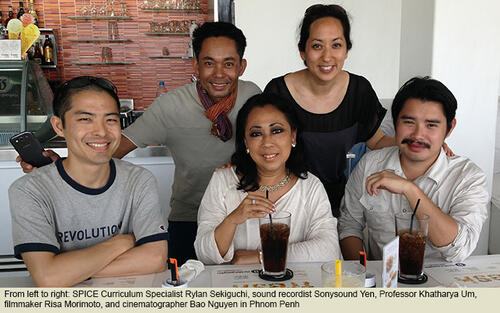91łÔąĎ director Gary Mukai receives Stanford alumni award
In a ceremony held last night on Stanford campus, 91łÔąĎ Director received the 2015 in recognition of his leadership and service in the field of education.
“This year, we cannot be more honored to recognize Dr. Gary Mukai for his tireless and selfless work in advancing educational equity and increasing cultural competency in classroom curriculum and instruction,” remarked Van Anh Tran, Board Member of the Stanford Asian Pacific American Alumni Club (). “Gary pushes the boundaries of education and culturally competent K–14 curriculum.”
SAPAAC presents the Alumni Award annually to a distinguished Stanford alumnus who has made exceptional contributions to the Stanford community and broader community in service, leadership, or financial contribution. Past recipients of the award have included distinguished Stanford alumni from throughout the decades, comprising activists, philanthropists, artists, civil rights lawyers, businesspeople, a mayor, a California Supreme Court justice, and other luminaries.
“I feel so undeserving of this award,” reflected Mukai. “I am very humbled.”
That humility belies Mukai’s fierce commitment—and tremendous contributions—to the fields of international and cross-cultural education. Since joining 91łÔąĎ in 1988, Mukai has workshopped with thousands of K–12 teachers, locally and internationally, on culturally sensitive pedagogical training and curriculum resources. He has provided immersive enrichment opportunities to hundreds of teachers through 91łÔąĎ’s free multicultural professional development seminars. And he has established an intensive series of free online international relations courses for high school students—the first of its kind.
Despite these contributions, Mukai is perhaps best known for his work in curriculum development. Throughout his tenure at 91łÔąĎ, Gary has overseen the development of well over 100 curriculum units on themes as diverse as , , and . These cross-cultural materials have touched countless students over the past 27 years, both within the United States and abroad.
Mukai’s strong dedication to this work has inspired others to take up the banner of international and cross-cultural education as well. Victoria Yee was one. As a Stanford undergraduate, she worked under Mukai’s supervision to develop . It was her first exposure to the field of education, and her first glimpse of what life as an educator might be like.
“I had little training in curriculum design or pedagogy. However, Gary was incredibly nurturing, patient, and supportive through every proposal, revision meeting, and draft,” says Yee. “Through his mentorship, my confidence in navigating the education realm…dramatically improved, [as well as] my conviction in institutionalizing diverse global curriculum at schools and my ability to make a difference in education.” Today she is a U.S. Fulbright English Teaching Assistant in rural Taiwan, and she credits her path largely to Mukai’s tutelage and encouragement.
“He is truly an invaluable asset to Stanford and beyond.”
For his part, Mukai prefers to downplay the praise with humor. After formally accepting the Alumni Award at last night’s ceremony, he stepped to the podium and thanked the award’s presenters and his family for their unwavering support. “I am very touched,” he continued, “that many 91łÔąĎ staff (past and present)—as well as some of my friends—chose to come to see me instead of watch the top American Idol finalists this evening.”









